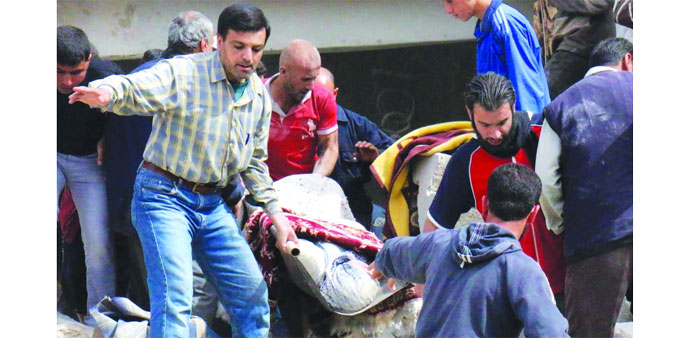Civilians carry a wounded woman following a reported barrel bomb attack by regime forces in Aleppo’s Sakhur district yesterday.
AFP/Damascus
Syria announced yesterday it will hold a June 3 presidential election, which is expected to return Bashar al-Assad to office despite a civil war that has cost tens of thousands of lives.
Underlining the persistent violence, mortar fire killed two people near the parliament building shortly before the election date was announced.
Syria’s first presidential election—after constitutional amendments scrapped a referendum system—is to go ahead despite violence which has killed 150,000 people since March 2011.
Speaker Mohamed al-Lahham announced the date in parliament, saying Syrians living outside the country would vote on May 28 and candidates would be able to register from today until May 1.
Voting would be “free and fair... and under full judicial supervision”, he said.
He urged Syrians “to give voice to their will through the ballot box and participate in the democratic process by electing whoever they think is most able to lead Syria to victory”.
Assad, who became president after his father Hafez died in 2000 and whose current term ends on July 17, is widely expected to run and win another seven-year mandate despite the conflict.
New election rules require candidates to have lived in Syria for the past decade, effectively preventing key opposition figures in exile from standing for office.
The opposition, which insists Assad step down and play no role in Syria’s future, rejected the election as nothing more than a “farce”.
“The Assad regime’s announcement today that a ‘presidential election’ would be held in June should be treated as a farce and be rejected by the international community,” said the office of opposition National Coalition leader Ahmed Jarba.
“With vast parts of Syria completely destroyed by Assad’s air force, army and militias over the last three years, and with a third of Syria’s population displaced internally or in refugee camps in the region, there is no electorate in Syria in a condition to exercise its right to vote.”
Much of the international community has also warned Syria against holding the vote, with UN-Arab League peace envoy Lakhdar Brahimi saying it could close the door to any peace negotiations.
Britain yesterday said holding the election during a time of war meant the result “will have no value or credibility”.
It remains unclear how Syria’s government will organise a vote under the current circumstances, with swathes of the country out of its control.
Syria’s conflict began with peaceful protests demanding democratic reform but soon escalated into a civil war after the government launched a massive crackdown on dissent.
Violence continues in many parts of the country, even reaching into the heart of the capital, which has regularly come under mortar fire from opposition fighters on the outskirts.
A security official said mortar fire in Damascus was expected to increase during the electoral period.
“They (rebels) will increase the fire this month to try to undermine the election,” he said.
Syria specialist Fabrice Balanche said the government could only stage the election on 40% of the country’s territory.
“The election can only be held in the government-held areas, a band of territory stretching from the Jordan border, through Damascus, Hama and Homs,” as well as Idlib city, Jisr al-Shughur, half of Aleppo and half of Deir al-Zor, he said.
An activist in Daraya, near Damascus, described the announcement as a new sign of military escalation in the conflict.
“Things are going towards escalation,” Amjad Abbar said via the Internet.
On the ground, regime forces were on the offensive yesterday in the central city of Homs, where the Syrian Observatory for Human Rights said clashes were continuing in the Bab Hud and Juret al-Shiyah districts.
Both rebel-held neighbourhoods have been under government siege for nearly two years.
In the northern city of Aleppo, meanwhile, activists said government aircraft dropped barrel bombs on several districts, a day after 52 civilians were killed in air raids in the province.
North of Damascus, a car bomb killed two soldiers at a checkpoint in Mashru Dummar.
UN slams announcement
The United Nations sharply criticised Syria’s decision yesterday to hold a presidential election on June 3 in the midst of war, saying it would torpedo a political resolution of the conflict.
UN chief Ban Ki-moon and special envoy for Syria Lakhdar Brahimi have both warned against elections in the current circumstances, spokesman Stephane Dujarric said.
They believe it “will damage the political process and hamper the prospect for a political solution that the country so urgently needs”, he said.
“Such elections are incompatible with the letter and spirit of the Geneva communique,” he added, referring to an agreement on a transition to democracy as the basis for negotiations between the government and the opposition.

